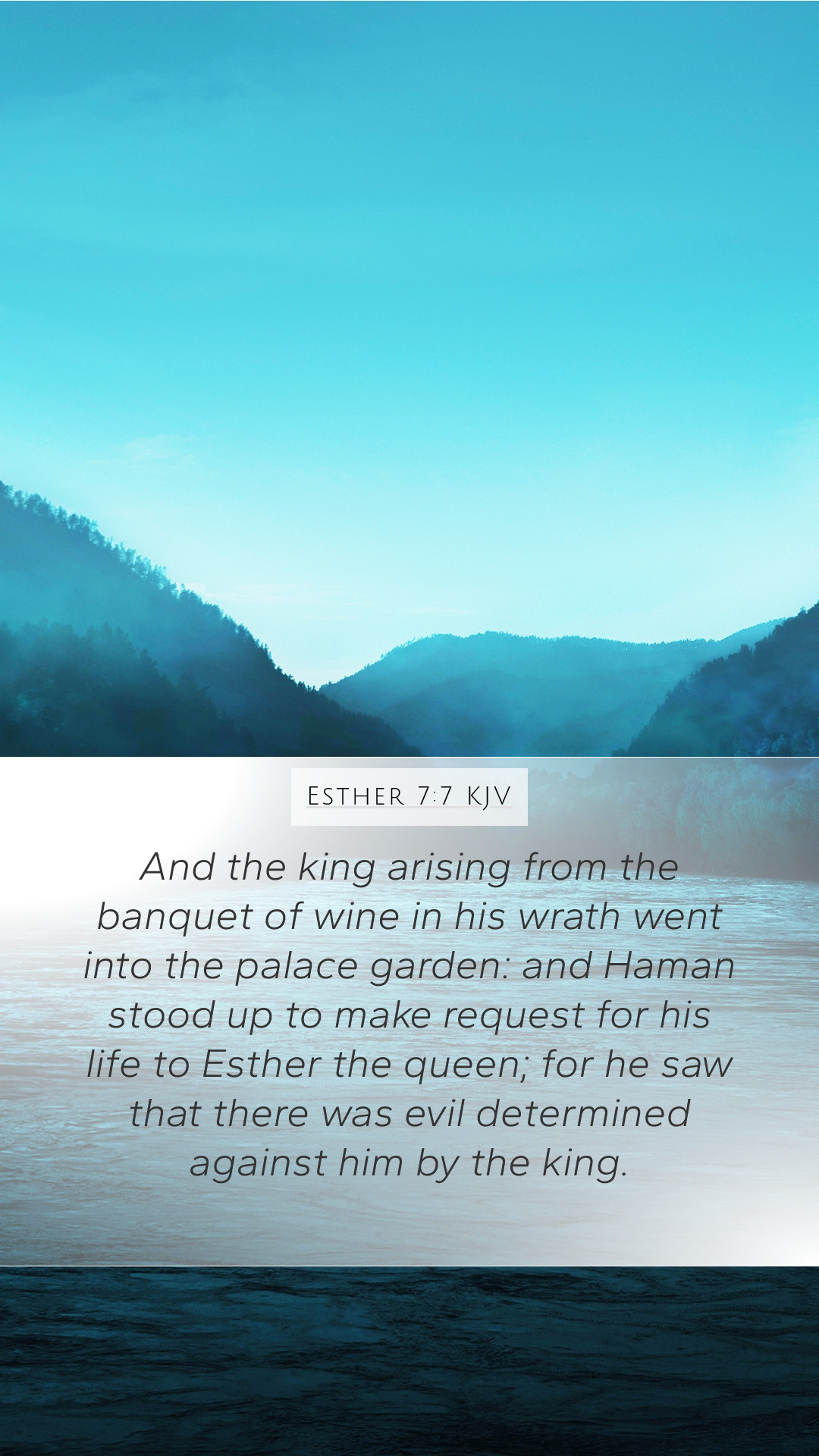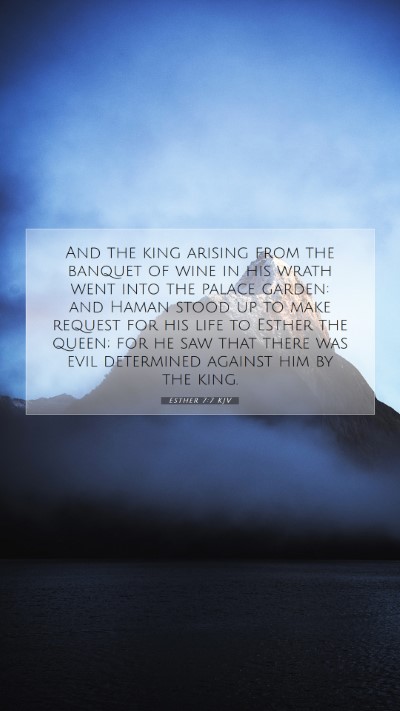Old Testament
Genesis Exodus Leviticus Numbers Deuteronomy Joshua Judges Ruth 1 Samuel 2 Samuel 1 Kings 2 Kings 1 Chronicles 2 Chronicles Ezra Nehemiah Esther Job Psalms Proverbs Ecclesiastes Song of Solomon Isaiah Jeremiah Lamentations Ezekiel Daniel Hosea Joel Amos Obadiah Jonah Micah Nahum Habakkuk Zephaniah Haggai Zechariah MalachiEsther 7:7 Meaning
What is the meaning of Esther 7:7?
And the king arising from the banquet of wine in his wrath went into the palace garden: and Haman stood up to make request for his life to Esther the queen; for he saw that there was evil determined against him by the king.
Esther 7:7 Bible Verse Meaning
Bible Verse Meaning: Esther 7:7
Esther 7:7 states: "And the king arose in his wrath from the banquet of wine, and went into the palace garden: and Haman stood up to make request for his life to Esther the queen; for he saw that there was evil determined against him by the king."
Overview of the Verse
This verse comes at a pivotal moment in the Book of Esther, where Haman's plot against the Jews, particularly against Esther's uncle Mordecai, is about to be unraveled. The king's wrath is sparked by discovering Haman's treachery, leading to tense and dramatic consequences.
Biblical Exegesis and Commentary
- Matthew Henry's Commentary:
Matthew Henry emphasizes the emotional turmoil of King Ahasuerus. The king's anger demonstrates the theme of divine providence, as he uncovers Haman's malice against Esther and her people. Henry points out that Haman's initial confidence turns to panic as he realizes the gravity of his situation.
- Albert Barnes' Notes:
Barnes highlights the dramatic irony of Haman standing before Esther, the very person he sought to destroy. Haman's request for mercy depicts his desperation, showcasing a reversal of fortunes—a common theme in Esther. Barnes notes that the timing of the king's anger directly correlates with Haman's impending doom.
- Adam Clarke's Commentary:
Adam Clarke discusses the cultural context, where asking for one's life directly from a royal figure was considered a grave act of humility. The king's departure to the garden signifies a moment of deep contemplation, and Clarke underlines the emotional stakes at play—the survival of an entire people resting on a precarious balance of royal favor.
Thematic Insights
The verse encapsulates major themes such as:
- Divine Justice: The swift turnaround of Haman's fortunes emphasizes that evil plans will be exposed.
- Reversal of Fortune: Haman, who was once exalted, finds himself humiliated, illustrating how pride goes before a fall (Proverbs 16:18).
- Divine Providence: The orchestrated timing of events in Esther’s story reaffirms God's sovereignty over human affairs.
Cross References
Related verses include:
- Tobit 3:4: A plea for mercy in dire circumstances.
- Proverbs 28:10: The downfall of those who mislead others.
- Galatians 6:7: The principle that one reaps what they sow.
Application for Today
This verse invites reflection on the consequences of our actions and the importance of humility before authority. In examining the motivations behind our desires, we can better align ourselves with ethical and moral integrity. As we study such narratives, we gain insights that apply to our daily lives—reminding us to act justly and treat others with respect.
Conclusion
Understanding Esther 7:7 through the lens of these commentaries enriches our appreciation for the complexities of the text. The dramatic unfolding of events serves as a powerful reminder of the importance of character, the potential for redemption, and the overarching theme of divine justice within Scripture.
Further Bible Study Resources
For deeper exploration, consider utilizing:
- Online Bible study tools and commentary collections.
- Bible study guides that focus on the Book of Esther.
- Study groups that facilitate discussions on themes of providence and justice.


